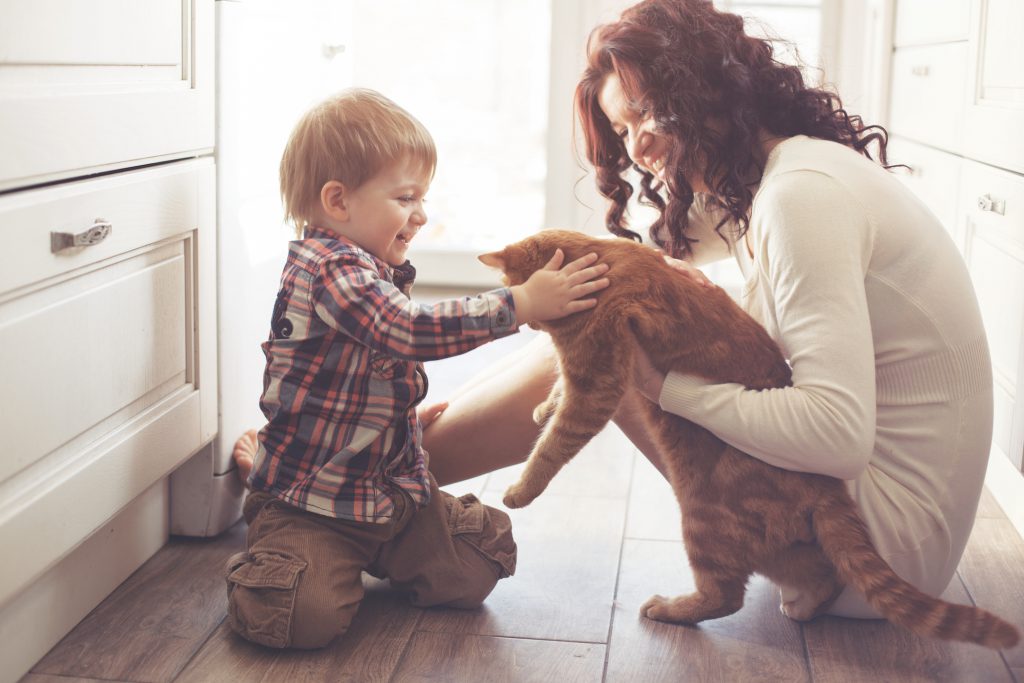
[vc_row][vc_column][vc_column_text]Growing up with a pet cat is a wonderful experience for children, they form strong relationships and cats have a lot to teach children. While parents may hold off on getting pets because of the difficulties that may occur, it doesn’t mean your child has to totally miss out on the joys of having a pet in the house. When introducing a cat or kitten to an older child, it’s important to ensure children and pets are safe around each other, and learn to respect each other’s personal space. So here are a few tips to ensure your cat and child get along famously:
 Creating Trust – Cats by nature are self-assured and intelligent beings. They do not compromise who they are for anyone, and they will teach your children how to respect them and others. To get the most out of the wonderful relationship between cats and kids, your child must learn to handle the cat with gentleness and respect to create trust between them. Your child should always stay calm and allow the cat to come to them – cats like relaxed, quiet environments and people, and they don’t tend to respond well to being forced into things. Children can naturally be overexcited and to your cat this feels like scattered and crazy energy – this can be overwhelming for your cat. Your child will learn that when they are in a calm and relaxed state, your cat will be happy to be around them. Cats can sometimes become aloof or aggressive. While it may seem that there is no reason for this, there may be an underlying cause. This is where an animal whisperer can be called upon, and we can assist in establishing the cause of the issues and advise your child on steps to follow in order to solve the problem.
Creating Trust – Cats by nature are self-assured and intelligent beings. They do not compromise who they are for anyone, and they will teach your children how to respect them and others. To get the most out of the wonderful relationship between cats and kids, your child must learn to handle the cat with gentleness and respect to create trust between them. Your child should always stay calm and allow the cat to come to them – cats like relaxed, quiet environments and people, and they don’t tend to respond well to being forced into things. Children can naturally be overexcited and to your cat this feels like scattered and crazy energy – this can be overwhelming for your cat. Your child will learn that when they are in a calm and relaxed state, your cat will be happy to be around them. Cats can sometimes become aloof or aggressive. While it may seem that there is no reason for this, there may be an underlying cause. This is where an animal whisperer can be called upon, and we can assist in establishing the cause of the issues and advise your child on steps to follow in order to solve the problem.- Learning how to play together – As cats are solitary animals it will teach your child great patience waiting for their kitty to be ready to play. Depending on the age of your children, all their interactions with your cat should be supervised by you. Your children will learn how to play with your cat, and vice versa. Remember, cats are natural born hunters, so certain actions such as teasing your cat with your hands or feet will ignite your cat’s hunting instincts which can cause them to play more rough. Teach your kids to use toys on poles only to play with your cat, and to respect when your cat is not interested in playing at all. Your cat and your children will learn each other’s boundaries. Children who have cats develop strong self-esteem as they have a greater sense of who they are and their importance because of their loving and devoted furry friend.
- Love & Affection – Cuddles and affection are a special part of the relationship we have with our animals. A cat’s purr has to be one of the most beautiful sounds in the world! Teaching your child how your cat likes to get affection is a crucial part of their relationship. Most cats enjoy a chin scratch, stroking along the back, and rubbing their cheeks all over you. It is up to you to teach your children how to read your cat’s body language – to know when your cat has had enough, and when they do not feel like getting cuddles at all. This is where learning how to communicate with your pets comes in very useful!. A cat can teach your child how to love and how to be loved in the best possible way.
- Respecting Your Cat’s Personal Space – Cats are highly tolerant creatures, however they must have their space and freedom to come and go as they please. It is ideal to keep your cat indoors only, as it keeps them safe and prevents the killing of native wildlife. Because of this, your cat needs to have their special spots in the house where they won’t be disturbed. Cats like being up high so it is ideal to have a tall cat scratcher with different hidey-holes on them. Constant access to spare rooms or cabinets is also ideal for your cat. Wherever their special spots are, your children must learn to respect your cat’s personal space and not invade them. Your cat must feel safe and free to move around the house whenever they feel like it. You can teach your children by explaining to them it is your cat’s ‘nap time’ and they cannot be disturbed right now. Not only will your children learn to respect the boundaries of animals, they will also learn this when interacting with other children and adults.
 Responsibility – sharing the responsibility of taking care of an animal can teach your child the importance of being organized and keeping to a schedule for their cat chores. Make it clear upon the arrival of their cat they must take full responsibility and what the individual chores will be each and every day regardless. Explain to them this is part of sharing your life with a cat not just play and cuddles. Don’t give in unless the animal is being neglected.
Responsibility – sharing the responsibility of taking care of an animal can teach your child the importance of being organized and keeping to a schedule for their cat chores. Make it clear upon the arrival of their cat they must take full responsibility and what the individual chores will be each and every day regardless. Explain to them this is part of sharing your life with a cat not just play and cuddles. Don’t give in unless the animal is being neglected.- Addressing Loss – When their cat passes away, you need to explain that this is a natural phenomena and will happen to all animals and people. Try as best you can to help them understand that their best friend is in a wonderful place and they will see them again one day. Your conversation will of course be modified depending on the age of your child. Try to place emphasis on the happy times with their furry friend not the sad ending
Animal Talk offers a grief counselling service to help your child understand where their cat has gone and why. We are also able to pass on the loving messages from their furry friend directly to them.
As the relationship develops your child will more than likely develop the need to make sure their furry friend is happy and comfortable. You may see them share their toys, food and even a favourite place. It will become natural to them to share with others also. Your child will love having a special friend in the house, especially if an only child or with older siblings.
Children will often confide all their innermost secrets and feelings to their furry loved one which gives them a great sense of relief and recovery from a trauma they may have experienced. They know their cat will never hurt them or betray their secrets. Cats will offer comfort and acknowledgement without question or judgement. A furry councillor in many ways.
Living with animals is an absolutely fulfilling experience for you and your children. It will teach them compassion, patience, and understanding towards animals and to other people. Following these tips will ensure there is a mutual bond of love and respect, creating long-lasting relationships with their animals, and more often than not they become your children’s first best friends.[/vc_column_text][/vc_column][/vc_row]
